Day: November 10, 2024
- What to expect as the UN’s COP29 climate change summit begins in Azerbaijan PBS NewsHour
- COP29 Azerbaijan: What’s at stake at the 2024 global climate summit? Al Jazeera English
- Live Briefing: Nations gather for U.N. climate talks in Baku, Azerbaijan The Washington Post

Abkhazia resists Russian investment agreement
Abkhazia’s opposition prepares to block ratification of a Russian-Abkhaz investment agreement. Residents from various regions are meeting with local deputies, urging them to vote against the deal.
The opposition argues that the unprecedented concessions for Russian big business will harm Abkhazia’s economy and pose security risks for the republic.
- Three threats posed by the agreement on Russian investments in Abkhazia. Opinion
- Op-ed: Agreement on Russian investments in Abkhazia’s economy is exploitative and humiliating
- “The President of Abkhazia is lobbying the interests of Russian oligarchs to stay in power.” – Opinion
Agreement signed “behind Parliament’s back”
At the end of October, Alhas Bartsits, chair of Abkhazia’s parliamentary committee on foreign relations, reportedly told Economy Minister Kristina Ozgan that parliament had only three “symbolic” comments on the draft investment agreement.
In reality, the official list included 20 amendments.
On October 30, Ozgan and Russian Economic Development Minister Maxim Reshetnikov signed the controversial investment agreement, incorporating only two of Abkhazia’s proposed amendments.
Parliament must now either ratify or reject the document, with a decision expected in the upcoming session.
Eight-year corporate tax break
The Russian investment agreement with Abkhazia grants an eight-year exemption from customs duties on imported construction materials and equipment, along with waivers on corporate property and profit taxes for investors.
The investor’s VAT rate will be just five percent, half the usual rate. This VAT rate was one of only two amendments accepted in the final agreement; in the initial draft, VAT was to be fully reimbursed to the investor from the Abkhaz budget until the project became profitable.
The Abkhaz government is also required to prioritize investors under this agreement—registered in a special registry—with preferential access to energy and infrastructure services.
Moreover, investors are permitted to mortgage government-provided land as collateral with banks, potentially allowing banks to repossess this “public” land if a project fails.
These terms are drawing sharp criticism from Abkhaz business owners, who see them as uncompetitive against large Russian companies, as well as from civil society, opposition groups, and a significant portion of parliament.
Tested method
During committee hearings, Parliamentary Speaker Lasha Ashuba stated that Economy Minister Kristina Ozgan had failed to protect Abkhazia’s interests and that “coordination with the government did not materialize.”
The opposition claims that the agreement is backed by certain Russian oligarchs and is determined to block its ratification. To this end, a special task force has been established to counter the document.
Citizen-led meetings with deputies are set to begin across the republic next week, an approach previously used last summer. Then, when President Aslan Bzhania attempted to push through a controversial bill allowing Russian entities to build and trade apartments in eastern Abkhazia, these “voter-deputy discussions” proved effective; parliament ultimately declined to consider the proposal.
Now, the opposition plans to deploy this strategy once more, hoping for a repeat of their summer success.
Abkhazia resists Russian investment agreement
Terms, place names, opinions and ideas suggested by the author of the publication are her / his own and do not necessarily coincide with the opinions and ideas of JAMnews or its individual employees. JAMnews reserves the right to remove comments on posts that are deemed offensive, threatening, violent or otherwise ethically unacceptable.




